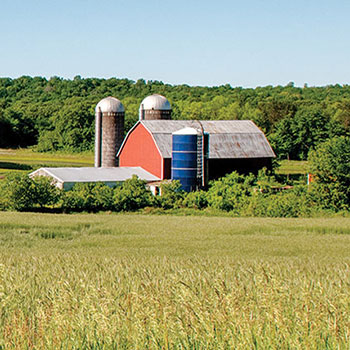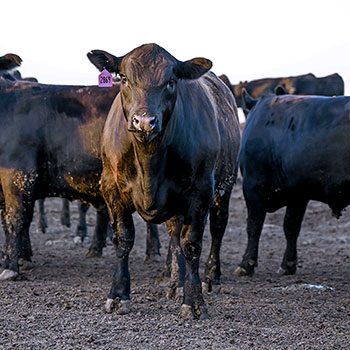New Vaccine Research Facility
Zoetis establishes research facility with Texas A&M University to develop vaccines.
Zoetis has signed an agreement with Texas A&M University’s Health Science Center for Innovation in Advanced Development and Manufacturing (CIADM) to establish a facility for accelerating the development of transboundary and emerging disease vaccines — including those for foot-and-mouth disease (FMD), a virus that can cause serious illness in cattle, pigs and sheep. Working side by side with Zoetis scientists, CIADM staff will collaborate in the development of processes, assays and formulations used to produce new vaccines.
As part of the agreement, Zoetis is setting up a 12,800-square-foot secure, biocontainment lab off-campus using modular cleanroom technology. The Transboundary and Emerging Disease Vaccine Development Facility is expected to be operational mid-2020, pending approval by the USDA to receive strains of the Zoetis FMD vaccine platform that are noninfectious to cattle and other livestock and, therefore, cannot cause the disease. While FMD vaccines will be the initial focus of the center’s vaccine development, the facility can be expanded to accommodate vaccine development for other emerging diseases in the future.
“We are proud to be working with Texas A&M in the development of this critical vaccine to protect the health of livestock in the U.S. and markets around the world. FMD is one of the most serious diseases for livestock owners, and through an innovative vaccine platform, we can help them reduce the risk of an outbreak and avoid significant economic losses,” says John Hardham, research director in global biologics research and director of the Zoetis center for transboundary and emerging diseases. “By combining our internal innovation efforts with world-class research institutions such as Texas A&M, Zoetis is in the best position to bring veterinarians and livestock producers solutions to better predict, prevent, detect and treat disease in the animals under their care.”
Chancellor John Sharp with The Texas A&M University System echoes that sentiment: “The Texas A&M System is uniquely qualified to be on the front lines of protecting animal health care. By protecting animals, we are also protecting human health, our food supply and our economy.”
“I am pleased that Zoetis decided to establish a collaborative effort with CIADM to develop critical animal vaccines. Our combined efforts to bring critical foot-and-mouth vaccines to the veterinarian market utilizing the novel Zoetis platform will be of significant benefit to both Texas and livestock communities around the world,” says William Jay Treat, chief manufacturing officer for CIADM with the A&M Health Science Center. “It is an outstanding entrepreneurial opportunity for the A&M Health Science Center to play a key role in Zoetis’ vaccine efforts.”
As part of establishing the new facility, the CIADM program expects initially to hire up to eight staff scientists in College Station by the first quarter of 2020.
About FMD
While FMD is not harmful to humans, livestock animals worldwide are highly susceptible to FMD viruses. An unchecked spread of FMD could result in an economic impact of billions of dollars in the first year, devastate international livestock trade, and severely impact the livelihoods of farmers and ranchers. FMD does not affect horses, dogs or cats; and it is not a food-safety threat.
As many countries across the globe are dealing with FMD in their livestock populations, the United States eradicated the disease here in 1929. The USDA’s Animal and Plant Health Inspection Service (APHIS) works to ensure the continued health of our nation’s livestock, including preventive steps to keep FMD from re-entering the country.
In April 2018, as a first step toward FMD vaccine development for the United States, the USDA granted Zoetis a select agent exclusion authorizing the company to develop vaccines using a modified, noninfectious FMD-LL3B3D vaccine platform in the United States. Through its collaboration with Texas A&M, Zoetis is now moving forward to safely develop an FMD vaccine that is not infectious and cannot transmit among livestock in the United States. With this vaccine platform, regulatory authorities and veterinarians may be able to distinguish between animals that have been vaccinated and those with natural FMD virus infection, which would help protect export markets for U.S.-raised meat.
Full-scale manufacture of FMD-LL3B3D-based vaccines is being considered but is not currently authorized in the United States.
Enhancing rapid response to emerging diseases
The Transboundary and Emerging Disease Vaccine Facility in Texas will be part of the Center for Transboundary and Emerging Diseases within Zoetis, which helps governments prepare for and protect against the threat of outbreaks of devastating diseases in animal health. As infectious diseases are occurring with greater frequency and geographic impact, the Center serves as a virtual hub that brings together Zoetis’ capabilities in surveillance and alliances with animal health centers of excellence worldwide, along with expertise in vaccine development, regulatory affairs and flexible manufacturing capacity to effectively prevent and control infectious disease outbreaks.
Editor’s note: This release is from Zoetis and Texas A&M University.




